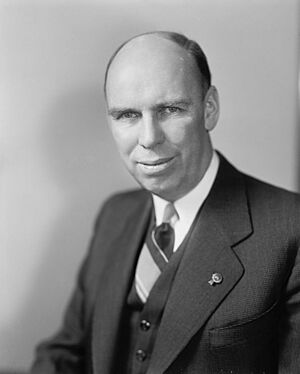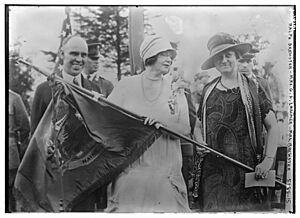Owen Brewster facts for kids
Quick facts for kids
Owen Brewster
|
|
|---|---|
 |
|
| United States Senator from Maine |
|
| In office January 3, 1941 – December 31, 1952 |
|
| Preceded by | Frederick Hale |
| Succeeded by | Frederick G. Payne |
| Member of the U.S. House of Representatives from Maine's 3rd district |
|
| In office January 3, 1935 – January 3, 1941 |
|
| Preceded by | John G. Utterback |
| Succeeded by | Frank Fellows |
| Chair of the National Governors Association | |
| In office June 29, 1925 – July 25, 1927 |
|
| Preceded by | Elbert Lee Trinkle |
| Succeeded by | Adam McMullen |
| 54th Governor of Maine | |
| In office January 7, 1925 – January 2, 1929 |
|
| Preceded by | Percival P. Baxter |
| Succeeded by | William Tudor Gardiner |
| Personal details | |
| Born |
Ralph Owen Brewster
February 22, 1888 Dexter, Maine, U.S. |
| Died | December 25, 1961 (aged 73) Brookline, Massachusetts, U.S. |
| Political party | Republican |
| Education | Bowdoin College (BA) Harvard University (LLB) |
| Military service | |
| Allegiance | |
| Branch/service | United States National Guard |
| Rank | |
| Unit | Maine National Guard |
Ralph Owen Brewster (born February 22, 1888 – died December 25, 1961) was an American politician from the state of Maine. He was a member of the Republican Party. Brewster served as the 54th Governor of Maine from 1925 to 1929. He also served in the U.S. House of Representatives from 1935 to 1941 and in the U.S. Senate from 1941 to 1952. Brewster was known for being a close friend of Senator Joseph McCarthy and for his disagreements with businessman Howard Hughes.
Contents
Owen Brewster's Early Life and Education
Ralph Owen Brewster was born in Dexter, Maine. His father, William E. Brewster, was a banker and also served in the Maine House of Representatives. Owen Brewster was a direct descendant of early American settlers who arrived on the Mayflower ship.
He attended Bowdoin College and graduated in 1909. After college, he worked as a high school principal for a year. Then, he went to Harvard Law School and became a lawyer in 1913.
In 1915, he married Dorothy Foss. From 1915 to 1923, he was part of the Portland School Committee. He also worked as a lawyer in Portland, Maine.
Owen Brewster's Start in Politics
Brewster began his political career in 1916. He was elected to the Maine House of Representatives. However, he left his position to join the Maine National Guard when the United States entered World War I. He served as a private, then a lieutenant, and finally a captain.
After the war, he returned to the Maine House of Representatives. He served there until 1922, when he was elected to the Maine Senate. He remained in the State Senate until 1925.
In 1924, Brewster ran for Governor of Maine. During his campaign, he faced accusations of being supported by a controversial group. Although he denied these claims, some members of this group openly supported him. His election caused some disagreements within his own Republican Party.
Owen Brewster's Time in Congress
After serving two terms as governor, Brewster ran for the U.S. House of Representatives in 1932. He lost that election but won in 1934. He served in the House until 1941, when he became a U.S. Senator. He was re-elected to the Senate in 1946.
Working on Important Committees
As a Senator, Brewster was part of several important committees. One was the Special Senate Committee to Investigate the National Defense Program, also known as the Truman Committee. He also served on the committee that investigated the attack on Pearl Harbor. His work on these committees made him well-known in Washington, D.C.
Views on Government Programs
Brewster supported laws that helped provide pensions for older people, which was an early idea for Social Security. However, he often disagreed with President Roosevelt's "New Deal" programs, which involved a lot of government spending and welfare.
He also played a role in stopping a large power project in Maine. This project was supported by President Roosevelt. Brewster accused a government lawyer of trying to stop the project unless Brewster agreed with the administration on other issues. This led to a heated public argument.
Association with McCarthyism
After World War II, Brewster became friends with Senator Joseph McCarthy. McCarthy was known for leading investigations into people he accused of being communists. This period, called McCarthyism, became very unpopular. Brewster's association with McCarthy caused him to lose some political support in Maine. Another Republican from Maine, Margaret Chase Smith, strongly disagreed with McCarthy and Brewster.
Disagreements with Howard Hughes
Brewster became nationally famous because of his conflict with Howard Hughes. Hughes was one of America's richest people and owned a major airline, TWA.
Investigating Hughes's Businesses
In 1947, Brewster was the chairman of a special Senate committee. This committee was looking into how the government bought supplies during World War II. Brewster claimed that Hughes had received a lot of money from the government but hadn't delivered the aircraft he promised.
However, Hughes argued that Brewster was trying to help a rival airline, Pan-American Airways. Hughes claimed that Brewster was pushing for laws that would give Pan-American Airways a monopoly on international flights for the U.S.
The Senate Hearing and Its Impact
Hughes fought back against Brewster's accusations. He claimed that Brewster was corrupt and had offered to end the Senate investigation if Hughes would merge his airline with Pan-American.
During a Senate hearing, Hughes repeated these claims. Brewster denied them and made his own accusations against Hughes. The hearing was very dramatic and captured the nation's attention. By the end, Brewster's reputation had been damaged. Even though Hughes was very wealthy, he appeared to many as the "little guy" who stood up to a powerful politician.
Brewster's Political Defeat
In 1952, Hughes worked hard to make sure Brewster would not be re-elected. He helped convince the Governor of Maine, Frederick G. Payne, to run against Brewster in the Republican primary election. Hughes provided a lot of money for Payne's campaign.
Payne's campaign connected Brewster to McCarthyism and also brought up Hughes's claims of corruption. This led to Brewster's unexpected defeat in the primary election. He resigned from his Senate seat in December 1952.
Later Years and Legacy
After leaving the Senate, Owen Brewster remained involved in many conservative groups. He was a Christian Scientist and served as President of The First Church of Christ, Scientist in Boston for one year. He was also a member of many other organizations, including the American Bar Association, the American Legion, and the Freemasons.
Brewster passed away unexpectedly from cancer on Christmas Day, 1961, in Brookline, Massachusetts. He was buried in Dexter, Maine. His former home in Dexter is now a bed and breakfast.
 | Jewel Prestage |
 | Ella Baker |
 | Fannie Lou Hamer |


